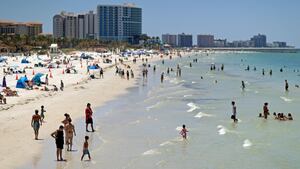MIAMI—Shortly after midnight Saturday, Suleiman Yousef’s stomach grumbled: He wanted chicken wings.
But there was only one place in his neighborhood with a kitchen open until 4 a.m., the 36-year-old bail-bond agent told The Daily Beast. After a brief phone call with the VIP manager of a strip club called Gold Rush Cabaret to find out their COVID-19 safety precautions, Yousef walked the five blocks to the joint, which was back in business two weeks ago thanks to the latest phase of reopenings under Republican Gov. Ron DeSantis.
“When you walk up, they make sure you have a mask, they take your temperature, and spray your hands down with some alcohol solution,” Yousef said. “You could only take your mask off if you are eating.”
Yousef told The Daily Beast he’d avoided going to any essential businesses—even grocery stores—earlier in the pandemic. But in the wee hours of Saturday morning, he stepped inside the enclosed venue filled with exotic dancers and bar staff, ordered his chicken wings, and observed the surreal scene for about an hour.
“There were probably around 100 people, 50 of them dancers,” he said.
The club’s precautions—including an attempt at social distancing—made him feel there was minimal risk of catching the coronavirus from the impulsive visit, Yousef said. But asked if he’d endorse a patient easing out of quarantine like that—even with distance and a mask—Bernard Ashby, a vascular cardiologist based in Miami Beach, told The Daily Beast: “It’s not worth it.”
“There’s active community spread,” Ashby added. “If you’re young, you’re old, it doesn’t matter.”
Indeed, conversations with experts and residents suggest that despite a wide range of social-distancing practices, Florida’s party- and tourism-fueled economy is stoking the flames of a disastrous surge in COVID-19 infection. In fact, as the number of positive cases in Florida has catapulted in recent weeks—with new records being made seemingly by the day—the state has emerged as a new national locus for what might prove to be an exceptionally deadly summer.
“We haven’t seen a magnitude of increase like this since we saw those epidemics in the Northeast,” said David Rubin, director of the PolicyLab at Children’s Hospital of Philadelphia, whose models have played a role in White House policymaking. “Temperature and humidity alone are not going to bail them out here. They need much more buy-in from the community in terms of distancing and hygiene.”
DeSantis began lifting a statewide “stay-at-home” order on May 4, and restrictions across Florida were rolled back in the following days. Regions outside of hot spots like Miami-Dade and Broward counties are in Phase 2, with gyms and professional sports venues and retail stores at full capacity, while bars and restaurants are at 50 percent capacity.
For every business that attempts to enforce strict measures, there are other establishments that flout the rules. Miami Mayor Francis Suarez endured a personal backlash when he recently dined at Swan, a restaurant co-owned by Pharrell in Miami’s Design District. Photos and videos from the evening posted on social media showed many patrons, including Suarez, without masks, standing arm-to-arm inside a packed restaurant. On Saturday, Swan and two other restaurants were temporarily shut down for allegedly not complying with Miami-Dade restrictions. Suarez’s spokesperson told The Miami Herald that the mayor “was not part of a party. He was there for dinner.”
But an analysis by The Florida Times-Union found that no fines had been levied and no enforcement action taken in 335 complaints of restaurants and bars violating the governor’s capacity and social-distancing orders since the reopening on May 4. Such violations may prompt a second-degree misdemeanor punishable by as much as 60 days in jail and a $500 fine.
Instead, the Florida Department of Business and Professional Regulation has “worked with license holders to educate them on the executive orders and bring them into compliance,” a spokeswoman for the agency told the newspaper.
“This half-assed reopening does more damage than good,” Yousef conceded, when thinking back on his outing. “If one person has it and it spreads again, it ruins it for people who have to work for a living. It’s easy for government officials to make decisions that impact everybody because they are still getting their direct deposit every two weeks.”
Florida was one of more than a dozen states Monday with upward trends for daily case counts of the virus, with more than 100,000 confirmed cumulative cases and 3,266 deaths. Miami-Dade County, which had the highest number of infections Monday, had 710 new cases overnight, and on Tuesday, a local hospital reported it had reached capacity.
Sunday was also the 19th consecutive day that the tally of new positive test results for the novel coronavirus exceeded 1,000 across the entire state, according to The Tampa Bay Times. In a spectacular 10-day stretch, cases on the radar of the state’s health department more than doubled, the paper found.
“The quarantine was working initially, but we’re seeing now a significant spike,” said Leonardo Alonso, an emergency-room physician in Jacksonville who has been treating COVID-19 patients. “I’ve seen more cases across all age groups.” On Monday, the city’s fire chief said 66 firefighters and 13 lifeguards were not working because they had entered coronavirus quarantine after co-workers tested positive, as the Times-Union reported.
“The younger you are, the less likely that you’re going to get hospitalized, but it doesn’t guarantee you won’t,” said Alonso. “They’re playing the odds, and the odds are in their favor, but there are young people who have died from this. It can be severe and long-term.”
It speaks to how much the numbers have shifted that New York Gov. Andrew Cuomo on Thursday mulled quarantining travelers from Florida to New York after—just months earlier—DeSantis required New Yorkers who traveled to Florida to quarantine. In reference to Cuomo’s heavily criticized response to nursing-home outbreaks, DeSantis quipped on Saturday: “I would just ask if that’s done just please do not quarantine any Floridians in the nursing homes in New York.”
Then, in a press release Sunday, the Florida Department of Health said 17 residents had died from the virus in Broward, Dade, Highlands, Indian River, Pinellas, and Seminole counties. More than half of Florida’s COVID-19 deaths have been linked to long-term-care facilities, and like the governor’s office, the Health Department did not respond to a request for comment from The Daily Beast on Monday.
Projections from The PolicyLab last week showed that “Florida has all the makings of the next large epicenter” and that “the risk there is the worst it has ever been” since the pandemic began. “Miami and Florida’s southeastern counties now join the Tampa/Fort Myers area and Orlando for a fairly widespread transmission event that we forecast will continue throughout the state,” said the lab, in a blog post. On Monday, players on the Orlando Pride soccer team tested positive, sabotaging their participation in the National Women’s Soccer League Challenge Cup. According to the Orlando Sentinel, some players were believed to have gone out to a bar in recent days.
“It’s a real test for the state to recalibrate their response,” Rubin said of the larger COVID-19 trendlines, as leagues from the MLB—which had to postpone spring camp after multiple positive tests this past week—to the NBA sought to restart play in the state.
Disturbing though it may be, Florida’s state-level data has also come into question in recent months after a data researcher said she was fired by the state. DeSantis, like other governors, has refused to order a statewide mask mandate, but has given permission for localities to impose their own guidelines and mask-wearing requirements. Late Monday, the mayors of 14 Miami-Dade cities, including Suarez, announced residents would now be required to wear masks in public.
But cases haven’t just been going up—the demographics have also been changing.
One month ago, researchers in Washington state noticed that half of new daily infections were occurring in people under 40. That was a dramatic increase from eight weeks earlier, when older age groups made up more than two-thirds of the patients who tested positive, according to their report.
Fast-forward a few weeks, and Arizona and Florida have reported similar shifts. DeSantis said the state’s new infections have skewed younger, with more people in their twenties and thirties testing positive, The New York Times reported. That data is particularly concerning as schools, colleges, and universities throughout the country hope to return students to campus in the fall.
“I totally get people needing to socialize after quarantine,” said Alonso. “But I think every individual has to weigh that but remember that we’re a society, [and] need to think about potentially spreading it when they go out.”
Charles Lockwood, senior vice president of University of South Florida Health and dean of the university’s Morsani College of Medicine, said his message to young people socializing without precautions was a simple one: “Stop.”
“This has been a really terrifying and interesting past month,” said Lockwood, noting that Tampa’s Hillsborough County was at first “a model of how to do it right” before “suddenly the rate of cases began to climb.”
“Cases have increased sixfold while testing has doubled in the past three weeks and the average age of cases has dropped by 25 percent—so this sudden, unexpected increase is being driven by younger folks non-complaint with social distancing and face covering,” said Lockwood.
“We’re seeing the bottom fall off in terms of younger folks getting infected,” Lockwood told The Daily Beast. “Our worry is that these young folks are going to start infecting their parents and grandparents.”
Making Florida’s situation even more complicated: President Trump is set to deliver a national convention speech in Jacksonville, inside a 15,000-seat arena, on Aug. 27.
In a letter published this month, 100 doctors said they were “concerned” about the Republican National Committee’s decision to bring thousands of people into the city in a packed indoor public gathering when “infections and deaths in Florida are on the rise.”
Specifically, the doctors asked that DeSantis require attendees to wear masks and social distance, implement a rapid testing regimen in Jacksonville before the event, and put screening and safety procedures in place at the facility.
But if the Tulsa rally last weekend was any indication, attendees at the Republican National Convention are not likely to wear masks.
Likewise, the scene at a Trump property in the state was less than encouraging Monday.
At the expansive Trump National Doral Miami, signs posted throughout the building asked for guests to wear face coverings and practice social distancing. Security guards and attendants did, but golfers often did not as they strode toward the marble-tiled lobby’s restaurant and bar for drinks.
That evening on Miami Beach’s Ocean Drive, outdoor cafes were moderately busy and small clusters of beachgoers traversed the sidewalks. Near a marble obelisk equipped with a clock and a thermometer near 10th Street, Steven Taylor and two friends leaned against the wall. The 25-year-old from Winston-Salem, North Carolina, said the trio arrived on Sunday for a five-day vacation.
“I’ve been enjoying my time,” he told The Daily Beast. “Good vibes, no bad energy, and great scenery.”
Taylor said he was vaguely aware of the spike in new coronavirus cases in Florida, but not the record numbers reported in the past week. He shrugged off any concerns.
“It’s in the back of my mind,” he said. “Right now, the world is freaking out. But only old people and people with weak immune systems have died from it. If you eat fattening foods, don’t work out and don’t take care of your body, it is going to be hard to fight it.”




